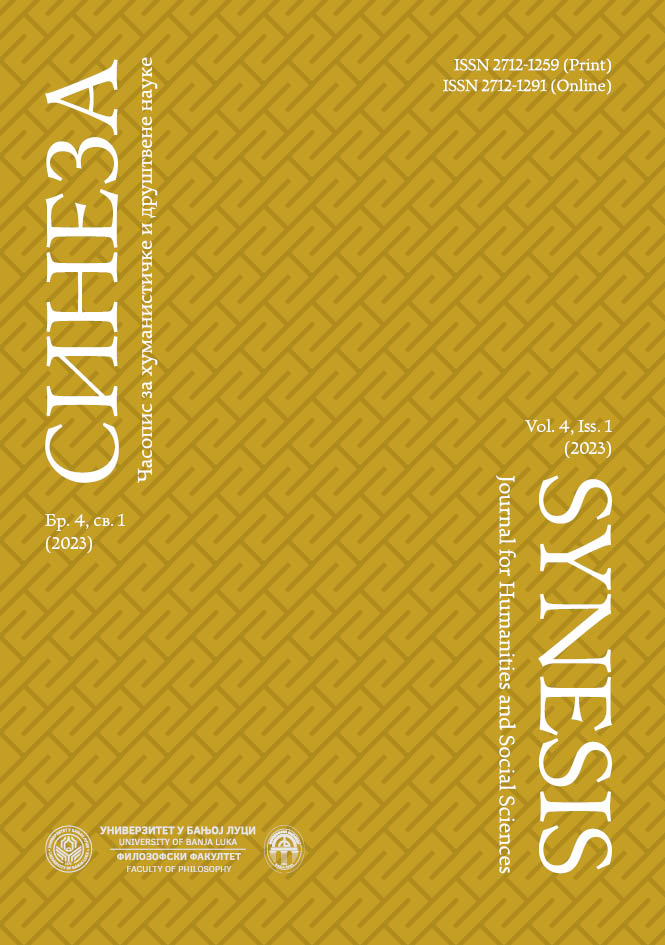Филозофско-методолошки осврт на агресивност и алтруизам као два фундаментална облика друштвеног понашања
Aggression and altruism as two fundamental forms of social behavior
Author(s): Ognjen R. Kandić, Biljana BaltaSubject(s): Philosophy of Science, Sociobiology
Published by: Filozofski fakultet, Univerzitet u Banjoj Luci
Keywords: sociobiology; aggressiveness; altruism; man; animal;
Summary/Abstract: Аreas of sociobiological study include research on aggressiveness, sexuality and sexual selection, parental role, kin selection, and altruism and reciprocal altruism. Each thematic area that we have listed here depicts a fundamental impulse for the emergence of sociality. Nevertheless, in this paper, we limited ourselves to the first and last impulse and tried to shed light on aggressiveness and altruism as two fundamental forms of social behavior. Sociobiology is based on a theory according to which the central life process is nothing more than the struggle of genes for their own reproduction. According to this popular theory, every organism inherits tendencies toward developing a certain type of behavior. These behavioral patterns significantly increase the chances that animals and humans will pass on their genes to future generations. In this paper, the authors focus on two, in their opinion, most striking and extremely different characteristics of human and animal behavior–aggressiveness and altruism. Through a series of examples and analyses of conflicting theories, the authors tried to figure out whether these traits are innate to the human race, how much of such behavior can be understood from an evolutionary perspective, and whether results obtained by sociobiology based on research of the animal world are applicable at all to the human race itself. We have seen that the cultural evolution of aggressiveness is driven by three different forces: (1) genetic predisposition towards some form of social aggressiveness; (2) needs imposed by the environment; and (3) the previous history of the group that creates a tendency to accept one cultural innovation and reject another. On the other hand, under altruism, sociobiology implies specific ways of behaving that bring much more benefit to another individual than to the one who provides them. However, sociobiology makes a distinction between “hard” and “soft” altruism. Only “hard” altruism definitely harms an individual by benefiting another individual. The so-called “reciprocal” altruism consists of results that will later bring benefits to the active individual. But, similar to the case of aggressiveness, the form and intensity of altruistic actions are determined to a significant extent by culture because the evolution of human society is incomparably more cultural than genetic. Although it does not answer questions about the differences between societies, the sociobiological hypothesis can still explain to some extent why and how human beings differ from other mammals. What is indicative is that almost all forms of altruism are shown to be selfish in a certain way, which makes the evolutionary theory of this already complex phenomenon even more complex. It is clear that no possible form of human altruism leads to total self-destruction. Even those great and famous heroisms are paid for by the expectation of certain recognitions and rewards, not excluding the belief in the immortality of the soul. It will be shown that what has always driven societies and civilizations was the connection between cultural evolution and organized violence. It seems that this combination has brought us to the brink of self-destruction today. In proportion to the growth of the centralization and complexity of societies, the organization and skill of warfare developed. This led to the urge to suppress rival cultures and the expansion of existing territories sufficient for life, which, in a way, permanently keeps us in that Hobbes’ eternal state of war of all against all, where man is nothing but a wolf to man. From this perspective, it is clear that if we want to create stronger foundations for peace, we must build political, cultural, and other ties that form a more tightly intertwined network of mutual solidarity.
Journal: Sineza
- Issue Year: 4/2023
- Issue No: 1
- Page Range: 77-90
- Page Count: 14
- Language: Serbian

